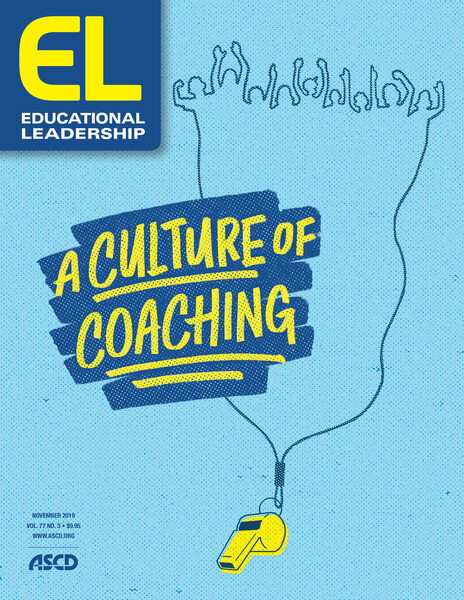Listen to an audio version of this article.
Erika had taught middle school for six years when she was promoted to grade-level team leader. Though excited and confident, she knew that leading her peers would be challenging, so she asked her principal for coaching as she transitioned into the new position. Even though she had never experienced coaching as a teacher, based on her time as an elite athlete during her high school and college years, she knew coaching could impact her performance.
I myself am not an athlete, but Erika (whom I soon coached) encouraged me to see the connection between the two fields. Just like in an athletic coaching session, you get out of instructional coaching what you put in. From my experience as a coach and leader of coaching programs over the years, I've developed six tips to help teachers bring their A game to the coaching process.
1. Ask Questions
Since coaching is a relationship, most of the preparation before each coaching session is internal rather than external. When you begin, it is important to understand the coaching norms for your school or district. Some coaches start by looking at data—classroom observations, formative and summative student assessments, or teacher evaluations. Other coaches expect the teacher to provide the topic of discussion based on the teacher's own professional learning goals. The following questions might be helpful to ask your coach before your first session:
Will classroom observations be part of our coaching interaction? If so, will I have your observation notes to reflect on prior to our session?
What data or artifacts (student test scores, assignments, lesson plans, formative evaluations) would be helpful for me to bring to our conversations?
Will I have the flexibility to select the topic based on my current development needs, or are our sessions going to focus on topics set by our school or district?
Trust is the bedrock of any coaching relationship. Clarity around what information from coaching sessions and classroom observations will be shared and with whom is necessary for that trust to develop. If your coach is an employee of the school or district, the coaching model will likely involve some level of communication between the coach and the school administration. Some coaches share only the topics that are discussed between the coach and teacher, and others include the goals teachers set and progress toward those goals. Still other coaches work within the norm that no information in the coaching session will be shared with others. Any of these approaches work if they are transparent and agreed to by all parties. The following questions may be helpful for a discussion around this issue:
What expectation of confidentiality can I have when I share information in our coaching sessions?
If the conversations are not entirely confidential, what kind of information will be shared? And with whom?
If I want to discuss something personal, how can we agree that it will not be shared outside of our conversation?
2. Start with a Positive Attitude
Sometimes teachers approach their first coaching session like they are going to the doctor or the dentist—with some amount of trepidation or even fear. Will it hurt? Will the coach give me bad news, some bitter medicine, or an uncomfortable exercise routine? Others view coaching as if they are going to a fairy godmother who will solve all their problems, and enter the relationship thinking the coach is going to do all the heavy lifting.
A simple change in metaphor can generate an attitude that leads to learning: What if, for example, you were going to see your tennis coach instead of the dentist? This is your time out from working for others to work for yourself and fine-tune your game so that you can grow in ways that will not only impact your practice now, but also boost your ability to take on future challenges.
Twenty years ago, many organizations used coaching only with poor performing employees, but coaching today is seen as a developmental relationship that can lead to improved performance and professional growth for the best teachers and leaders. "Coachable" individuals know they can learn and improve, so they are more likely to request feedback and act on it. They are also more likely to be competent in what they do, and they are often seen as courageous and adaptable. As Erika discovered in her district, asking for coaching was met with admiration. Here was a person who was self-aware and determined to grow.
There may be times, despite your positive attitude, when the coaching relationship is not working. Perhaps the coach is poorly prepared or seemingly untrustworthy. You have given the coach the benefit of the doubt and done everything you can to connect, but you feel the relationship is holding you back instead of supporting your growth. Honesty tempered with kindness is the best policy here. As leaders of a district-level coaching program, my colleagues and I handled the few complaints we received with additional training and coaching conversations with the coaches. Remember, one negative experience does not mean all coaching is not for you—have the courage to try again!
3. Show Up
As with sports, showing up means more than just being physically present. It means being fully in the moment, setting aside external distractions, and working to notice your own internal feelings, emotions, and physical reactions during a coaching session.
Showing up means setting aside unnecessary technology, finding a time and place where you won't be interrupted, and perhaps even putting a "Do Not Disturb" sign on the door. (Some of my colleagues have a "Recording in Progress, Do Not Disturb!" sign that is remarkably effective.)
Even with these barriers against external interruption in place, quieting internal distractions for a 30- or 45-minute session with a coach can be a formidable challenge. Fortunately, mindfulness practice offers tools to bring us to the present moment, and many coaches and teachers use them to prepare for coaching sessions. On occasion, when I notice a teacher is particularly stressed or distracted, I offer to go through a brief breathing exercise before we begin our conversation. Mindful breathing—to consciously breathe in through the nose, perhaps to a count of 4, hold it for 7, and then exhale through the mouth for 8 counts—helps quiets the mind. You can settle into your body and pay attention to the present, greeting and releasing the distractions of the past and future. Even if you only have a few seconds, three deep "belly breaths" can be practiced before a session or at any moment you want to let go of anxiety and stress.
Early in our coaching, Erika came to one of our sessions flushed and distracted. She shared that she had just received disturbing information from a parent. Even after a few mindful breathing exercises, she decided our planned topic for the day could not be addressed while she was experiencing such strong emotion. So we took a few minutes for her to express her feelings by noticing and labeling her physical and mental state. As we talked, Erika chose to use our time together that day to reflect on how she wanted to respond to the issues brought up in her difficult conversation. Sometimes, like Erika, you may wish to address the topic that is distracting you in the moment and put off the planned discussion for another session. Other times, three or four minutes of venting may be all you need to come back to the present. If you are tense or nervous and not sure why, share this with your coach. You may find insight into things that are bothering you that you were unaware of, and this awareness can lead you to look at current problems and situations in new ways.
4. Work Hard
Just like sports practice, effective coaching sessions are hard work. You will spend a concentrated time thinking deeply with your coach. You will examine your practice, your beliefs, your values, and your actions. Sometimes insight will come in a flash, and other times it will be a long, hard slog. Often, we unconsciously avoid this work by "filling the time" with lots of unnecessary details. To prepare for a session, reflect ahead of time and be ready to share a topic or issue succinctly. If you overshare details, don't be offended if a skillful coach politely interrupts and reminds you to keep the main thing the main thing—this is their job. Don't worry if you speak slowly and deliberately, or even sit in silence. Slowing the pace of the conversation can lead to accomplishing more as it gives you space to think and reflect.
Set aside your desire to receive ready-made advice from your coach and be prepared to make your own discoveries so that you can "coach yourself" in the future. In a recent session, Erika shared how coaching pushed her thinking:
I thought I would just tell you the problem and you would tell me what to do. But you didn't. You asked questions, and I thought about them, and most of the time I began to see the problem in a new way. Yes, this was harder than I thought it would be. But I am proud of myself, and I think I can ask myself the right questions next time.
5. Dig Deep
People who perform at the top of their game don't get there by following a rote formula devoid of creativity, passion, and innovation. Top performers in sports, education, business, and any creative endeavor learn to dig deep into who they are, bringing their unique gifts to their work.
Parker Palmer's classic work The Courage to Teach: Exploring the Inner Landscape of a Teacher's Life highlights what students have known about teachers for millennia. The best teacher is the one who brings her whole self to her work—her subject matter is her passion, and educating her students is her mission. Of course, as teachers, we often fail at this, because like everyone else we have inner demons and outer enemies that zap the energy required to bring our special gifts to our work. Coaching, when it is a relationship between a committed coach and an open-minded teacher, can become an arena for deep refreshment and growth.
Often teachers come to coaching thinking they will get what Petrie (2015) calls horizontal growth: more strategies, knowledge, and skills. While it is necessary and often invigorating to stay tuned in to research and best practices, new cognitive knowledge is not enough for elite performance. We teach in a VUCA world (volatile, uncertain, complex, and ambiguous) that requires deep insight into ourselves and how we show up in many different circumstances. Good coaching is deeply supportive of this kind of vertical growth that cannot be gained simply by acquiring knowledge and skills.
While seeking deep vertical growth, it is not unusual for an educator who is being coached to come face-to-face with something surprising or even difficult to accept. This is what Kegan (1982) calls a "subject"—an attitude, belief, or stance we developed over our lives to adapt to our environment and that we are largely unaware of. When we recognize these "subjects" through feedback and work with a coach, they become "objects"—something we have named and can recognize the next time they either interfere with or support our work.
Erika shared an area for her own vertical growth in one of our coaching conversations. She was asked by her principal what her goals were for the year, and she was easily able to list multiple tactics and strategies she wanted to implement. But when she was asked what her vision was for her grade-level team, she had no answer. In discussing this, Erika realized she had always gotten ahead by taking action, doing things quickly and expertly, but she rarely had a big goal or vision in mind. She was spending a lot of her time doing busy work, checking things off a list, but losing the big picture. She moved this stance (focus on the details) from a "subject" that defined her to an "object" that she could focus on and improve to become both a better teacher and a better leader.
Teachers who look at the coaching session as a way to handle only easy or short-term problems are missing out on one of the major benefits of coaching. Don't be afraid to explore your hopes, dreams, and fears with your coach. Dig deep and seek transformation, not just a transaction.
6. Practice, and Be Accountable
Learning doesn't stop after the coaching session is over. Most coaching sessions will end with some action you will take to expand on the progress you made. Maybe you have made a decision or created a plan and you need to implement it. Maybe you have made a discovery that you need to reflect on or identified an area of uncertainty that you need to explore.
One benefit of coaching is having someone to hold you accountable for following through. Erika knew that she was tempted to let busywork overwhelm her day, so she created a plan for how she would determine and share her big picture academic goals with her team. In our session, she created a list (using her go-to skillset) of tasks that would get her closer to creating these goals. Since we could not meet weekly, we agreed that I would email her on certain dates between our monthly sessions and request an update on her progress. She knew that putting off the "big chunks" of work was going to result in having to admit to me that she did not meet her own deadline.
One of Erika's self-appointed tasks was to hold a working session with her teachers to discuss their ideas for an academic vision. This was firmly outside her comfort zone, but moderate discomfort is a great place to learn! As any athlete knows, repeated moves become too easy over time and keep us in our comfort zone. But when we try new things, we enter the "learning zone." This is a lot less comfortable, because our effectiveness dips as we practice new skills. Many people give up when this happens and fall back on old habits. Coaching, however, can hold us accountable to our goals and can encourage us to keep at it until the new skills become just as comfortable as those already mastered.
Erika's first working session did not go quite as well as she planned. In a reflective conversation afterward, we rehearsed some group processes she might try leading her teachers through. She planned another meeting while her learning was still fresh and while she had the support of a coach to cheer her on. The second session went better, and Erika was motivated to advance her skills even further by researching meeting protocols and facilitation strategies.
A Path to Improvement
Coaching is neither a root canal nor a magic wand. You will not be given a painful operation or granted the resolution to all your problems. It is, however, an effective way to learn and improve performance in any professional endeavor. To make the most of coaching, ask questions, bring a positive attitude, show up, work hard, dig deep, and stay accountable. If you do this, you will find your coaching experience brings new vigor to your teaching and leadership.
Author's note: Erika's name and certain details have been changed. Quotes and pertinent facts are accurate.
Reflect & Discuss
➛ How do you (or your staff) typically prepare for a coaching session? Based on what you read, is there room for improvement?
➛ What could help you stay more present during a coaching session?
➛ What actions might you and your coach take to remain accountable after a coaching session?







